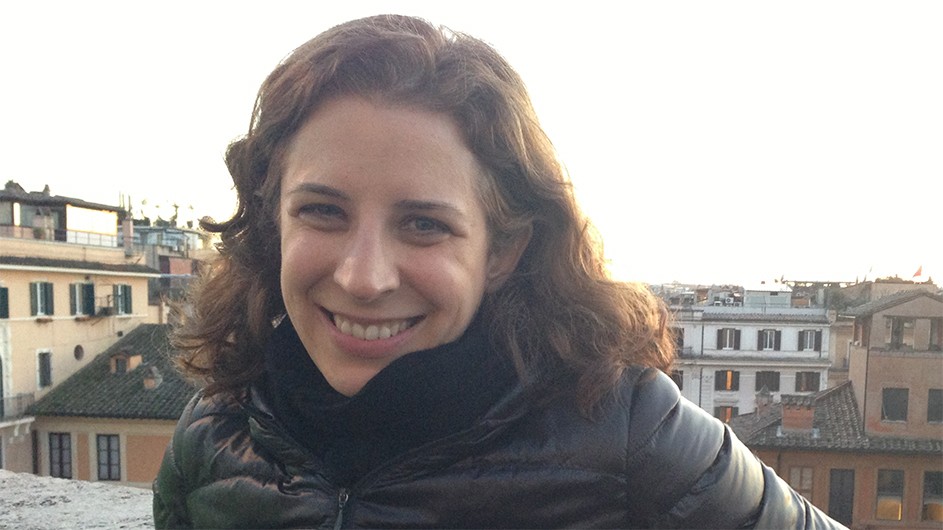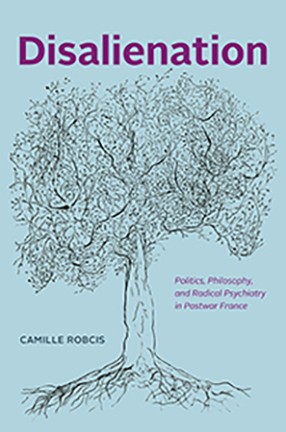The Meaning of Madness Is Explored in a New Book
Professor Camille Robcis takes on politics, philosophy, and radical psychiatry in postwar France in “Disalienation.”

From 1940 to 1945, 40,000 patients died in French psychiatric hospitals. The Vichy regime’s “soft extermination” let patients die of cold, starvation, or lack of care. But in Saint-Alban-sur-Limagnole, a small village in central France, one psychiatric hospital attempted to resist. Hoarding food with the help of the local population, the staff not only worked to keep patients alive, but began to rethink the practical and theoretical bases of psychiatric care. The movement that began at Saint-Alban came to be known as institutional psychotherapy, and would go on to have a profound influence on postwar French thought.
In Disalienation, Camille Robcis, a professor of history and French, grapples with the historical, intellectual, and psychiatric meaning of the ethics articulated at Saint-Alban by exploring the movement’s key thinkers, including François Tosquelles, Frantz Fanon, Félix Guattari, and Michel Foucault. Anchored in the history of one hospital, Robcis's study draws on a wide geographic context—revolutionary Spain, occupied France, colonial Algeria, and beyond—and charts the movement's place within a broad political-economic landscape, from fascism to Stalinism to postwar capitalism.
Robcis discusses her new book with Columbia News, as well as how she has kept herself and her students engaged during the pandemic, and who she would love to invite to a dinner party.
Q. How did you come up with the idea for this book?
A. I touched on the question of institutional psychotherapy and radical psychiatry in my first book, The Law of Kinship, which had a chapter on the intellectual critiques of the heterosexual reproductive family in the 1970s, and more specifically on Gilles Deleuze and Félix Guattari’s 1972 book, Anti-Oedipus. Guattari was very involved with institutional psychotherapy, and he worked in a psychotic clinic, La Borde, for most of his life, so I decided I needed to find out more about this movement. I then followed a long and fascinating archival trail that led me to Tosquelles, Fanon, Foucault, Canguilhem, and the other figures that I study in my new book.

Q. What might some of the psychiatric leaders discussed in the book say about the state of things today?
A. They would probably lament the state of psychiatry today, the way it has come to rely increasingly on neuroleptics at the expense of social/psychic treatments. For institutional psychotherapy, madness (or aliénation in the French double meaning of the term) was always psychic and social at once. The idea of focusing solely on the brain without taking into account the conscious and unconscious development of the subject was absurd.
I also think that they would have a lot to say about politics. Institutional psychotherapy was, after all, born with fascism, and its practioners were adamant about the fact that psychiatry and psychoanalysis could offer helpful insights to understand the rise and appeal of authoritarian movements. As Fanon once said, “All political leaders ought to be psychiatrists as well.” Obviously, with the rise of the extreme right in so many places around the world, authoritarianism and libidinal politics are still central issues that we are grappling with.
Q. Any reading recommendations?
A. This is not exactly a reading recommendation, but a listening one. An amazing side-effect of Zoom has been the ability to attend lectures and events worldwide. I recommend getting on different mailing lists and seeing what’s being discussed in other institutions and on other continents.
For example, I recently spoke for a series called “Fanon After Fanon,” organized by Achille Mbembe at the Wiser Institute in South Africa. The event was incredibly well attended, with people from all over the world, and it was simply exhilarating to be in conversation with scholars whom I deeply admire, even though they were in Johannesburg, London, Paris, and beyond.
Q. What's on your night table now?
A. That’s a hard question because my night table is very large: It always has a tall pile of books, and I alternate between them. When I’m not reading academic books, I love biographies. I just started Timothy Brennan’s new biography of Edward Said, Places of Mind. I’m still reading Benjamin Moser’s biography of Susan Sontag—a bit of a guilty pleasure, but very fun. And I’m also halfway through Hazel Carby’s Imperial Intimacies, which is fantastic, about her life growing up with a Jamaican father and a Welsh mother in postwar Britain.
Q. What did you teach this term, and how did you help your students cope with online learning?
A. This semester, I co-taught a graduate seminar, “Race and Sexuality in France and Its Empires,” with my colleague Emmanuelle Saada. We read some of the classic literature on sexuality and empire, but also a series of new books that have gotten a lot of attention over the past few years. I think that teaching on Zoom went okay. I certainly missed the opportunity to interact with students directly, but Zoom allowed me to invite guest lecturers from all the over the place, which was fun.
Q. You're hosting a dinner party. Which three academics or scholars, dead or alive, would you invite and why?
A. Since I just finished a book about these figures, I’m going to say Félix Guattari, Frantz Fanon, and Michel Foucault. I have chapters about each of these thinkers in the book, so I have spent a lot of time in the last few years thinking about them, thinking with them.
For a while, I had all their books spread out around my office, and I felt like they were almost my friends, like I knew them intimately and could say things such as, “Oh, Foucault, you changed your argument about power in 1972, but then refined it in 1973, and then it took this form in 1974.” So I would love a dinner party with the three of them, to hear them talk among themselves, and to see if they agree with my reading of their works.
Check out Books to learn more about publications by Columbia professors.